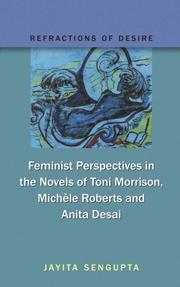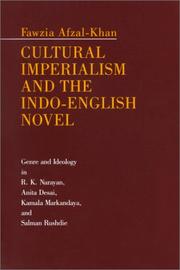| Listing 1 - 9 of 9 |
Sort by
|
Book
Year: 1999 Publisher: London : Vintage,
Abstract | Keywords | Export | Availability | Bookmark
 Loading...
Loading...Choose an application
- Reference Manager
- EndNote
- RefWorks (Direct export to RefWorks)
Desai (anita), 1937 --- -Desai (anita), 1937 --- -Desai (anita), 1937-
Dissertation
Abstract | Keywords | Export | Availability | Bookmark
 Loading...
Loading...Choose an application
- Reference Manager
- EndNote
- RefWorks (Direct export to RefWorks)
desai (anita), 1937 --- -desai (anita), 1937 --- -desai (anita), 1937-
Book
ISBN: 9783826044991 Year: 2011 Publisher: Würzburg : Königshausen & Neumann,
Abstract | Keywords | Export | Availability | Bookmark
 Loading...
Loading...Choose an application
- Reference Manager
- EndNote
- RefWorks (Direct export to RefWorks)
This book argues that Indian literature in English has brought forth a novelistic genre which can be described as ‘home fi ction.’ In contrast to the celebrated historical novels by writers such as Amitav Ghosh and Salman Rushdie, ‘home fiction’ revolves around the private space of home, the lives of women and their families. With its domestic setting and private histories, ‘home fi ction’ has developed particular literary strategies which effectively negotiate and critique discourses on nation, gender, and identity and thus transcend the supposedly private nature of the home. Casting a critical perspective on the male-dominated spaces of history and politics, this study focuses on two of the most prolifi c Indian- English women writers, Anita Desai and Shashi Deshpande, and the ways in which they dismantle the highly idealised image of the home as secluded female space. Die Autorin Ellen Dengel-Janic studied English and German literature at the Universities of Regensburg, Aberdeen and Tuebingen. She is a lecturer in English literature and cultural studies at the University of Tuebingen. Her major interests are in the field of Anglophone literatures and cultures, film studies and gender studies.
Book
ISBN: 033360802X Year: 1995 Publisher: Basingstoke Macmillan
Abstract | Keywords | Export | Availability | Bookmark
 Loading...
Loading...Choose an application
- Reference Manager
- EndNote
- RefWorks (Direct export to RefWorks)
Walcott, Derek --- Desai, Anita --- Ngugi wa Thiong'o --- Achebe, Chinua --- Desai (anita), 1937 --- -Achebe, Chinua --- -Desai (anita), 1937

ISBN: 9788126906291 8126906294 Year: 2006 Publisher: New Delhi: Atlantic,
Abstract | Keywords | Export | Availability | Bookmark
 Loading...
Loading...Choose an application
- Reference Manager
- EndNote
- RefWorks (Direct export to RefWorks)
Feminism in literature --- Desire in literature --- Morrison, Toni --- Roberts, Michele --- Desai, Anita, - 1937-
Book
ISBN: 9782130571087 Year: 2008 Publisher: Paris : PUF - Presses Universitaires de France,
Abstract | Keywords | Export | Availability | Bookmark
 Loading...
Loading...Choose an application
- Reference Manager
- EndNote
- RefWorks (Direct export to RefWorks)
This book offers a culturally-specific reading of Anita Desai’s In Custody informed by indigenous practices and beliefs, which enables global audiences to access contemporary Indian writing in English. It shows that certain constants in multiple belief-systems also allow points of entry, particularly in light of the internationalization of literatures in the post-colonial period. The author argues that Desai’s novel configures the writer’s view of and engagement with global society. It exemplifies transnational writings rooted in different canons which have always migrated, mixed, and mutated. Marta Dvorák investigates the intertextual dialogue programmed into Desai’s novel, which is part of the intercultural practices grounded in both relativism and universalism (Homi Bhabha). She shows how literature encodes ideologies, and how the ideologies are presented through the cultural filter of the author’s discourse conditioning readerly responses. Her study engages with the hybridized narrative traditions of English-language Indian writing, showing how narratives circulate from one culture to another, displacing the migrant symbols and myths through which our global society manufactures meaning.
Book
Year: 2002 Publisher: Vadodara : Maharaja sayajirao University of Baroda,
Abstract | Keywords | Export | Availability | Bookmark
 Loading...
Loading...Choose an application
- Reference Manager
- EndNote
- RefWorks (Direct export to RefWorks)
DESAI (ANITA), 1937 --- -SAHGAL (NAYANTARA), 1927 --- -MORRISON (TONI), 1931 --- -WALKER (ALICE), 1944 --- -ROMAN DE L'INDE DE LANGUE ANGLAISE --- ROMAN DE L'INDE DE LANGUE ANGLAISE --- ROMAN AMERICAIN --- FEMMES ET LITTERATURE --- FEMMES DANS LA LITTERATURE --- CRITIQUE ET INTERPRETATION --- 20E SIECLE --- FEMMES ECRIVAINS --- PAYS DE LANGUE ANGLAISE --- HISTOIRE ET CRITIQUE

ISBN: 0271009128 0271010134 0271072210 9780271072210 9780271009124 9780271010137 0271032952 9780271032955 Year: 1993 Publisher: University Park, Pa Pennsylvania State University Press
Abstract | Keywords | Export | Availability | Bookmark
 Loading...
Loading...Choose an application
- Reference Manager
- EndNote
- RefWorks (Direct export to RefWorks)
Cultural Imperialism and the Indo-English Novel focuses on the novels of R. K. Narayan, Anita Desai, Kamala Markandaya, and Salman Rushdie and explores the tension in these novels between ideology and the generic fictive strategies that shape ideology or are shaped by it. Fawzia Afzal-Khan raises the important question of how much the usage of certain ideological strategies actually helps the ex-colonized writer deal effectively with postcolonial and postindependence trauma and whether or not the choice of a particular genre or mode employed by a writer presupposes the extent to which that writer will be successful in challenging the ideological strategies of ";containment"; perpetuated by most Western ";orientalist"; texts and writers. She argues that the formal or generic choices of the four writers studied here reveal that they are using genre as an ideological ";strategy of liberation"; to help free their peoples and cultures from the hegemonic strategies of ";containment"; imposed upon them. She concludes that the works studied here constitute an ideological rebuttal of Western writers' denigrating ";containment"; of non-Western cultures. She also notes that self-criticism, as implied in Rushdie's works, is not be confused with self-hatred, a theme found in Naipaul's work.
Fiction --- Thematology --- English literature --- Imperialism in literature --- Indic fiction (English) --- Impérialisme dans la littérature --- Roman de l'Inde (anglais) --- History and criticism --- Histoire et critique --- Desai, Anita, --- Rushdie, Salman --- Criticism and interpretation --- Criticism and interpretation. --- LITTERATURE DE L'INDE DE LANGUE ANGLAISE --- LITTERATURE ET SOCIETE --- IMPERIALISME DANS LA LITTERATURE --- NARAYAN (R. K.) --- DESAI (ANITA), 1937 --- -MARKANDAYA (KAMALA), 1924-2004 --- RUSHDIE (SALMAN), 1947 --- -HISTOIRE ET CRITIQUE --- INDE --- 20E SIECLE --- Literature and society --- Imperialism in literature. --- History. --- Narayan, R. K., --- Markandaya,Kamala,

ISBN: 0415975212 Year: 2005 Publisher: New York London : Routledge,
Abstract | Keywords | Export | Availability | Bookmark
 Loading...
Loading...Choose an application
- Reference Manager
- EndNote
- RefWorks (Direct export to RefWorks)
The book focuses on the representation of South Asian life in works by four Anglophone writers: V. S. Naipaul, Salman Rushdie, Amitav Ghosh, and Anita Desai. Concentrating on the intertwined topics of nationalism, transnationalism, and fundamentalism, the book addresses the dislocation associated with these phenomena, offering a critical dialogue between these works and contemporary history, using history to interrogate fiction and fiction to think through historical issues. Despite all their differences, the works of these authors delineate the asymmetrical relations of colonialism and the aftermath of this phenomenon as it is manifested across the globe. The binary structures created by the colonial encounter undergo a process of dialectical interplay in which each culture makes incursions into the other. This dialogic interplay becomes the basis for strategies that enable transnational and postcolonial writers to reimagine themselves and their world.
Indic fiction (English) --- Nationalism and literature --- East Indians --- Transnationalism --- Globalization in literature. --- Roman de l'Inde (anglais) --- Nationalisme et littérature --- Indiens (Orientaux) --- Transnationalisme --- Mondialisation dans la littérature --- History and criticism. --- Intellectual life. --- Histoire et critique --- Vie intellectuelle --- Naipaul, V. S. --- Desai, Anita, --- Rushdie, Salman. --- Ghosh, Amitav, --- Nationalisme et littérature --- Mondialisation dans la littérature --- NAIPAUL (VIDIADHAR SURAJPRASAD), 1932 --- -DESAI (ANITA), 1937 --- -RUSHDIE (SALMAN), 1947 --- -GHOSH (AMITAV) --- ROMAN DE L'INDE DE LANGUE ANGLAISE --- TRANSNATIONALISME --- MONDIALISATION DANS LA LITTERATURE --- HISTOIRE ET CRITIQUE --- PAYS DE LANGUE ANGLAISE
| Listing 1 - 9 of 9 |
Sort by
|

 Search
Search Feedback
Feedback About UniCat
About UniCat  Help
Help News
News